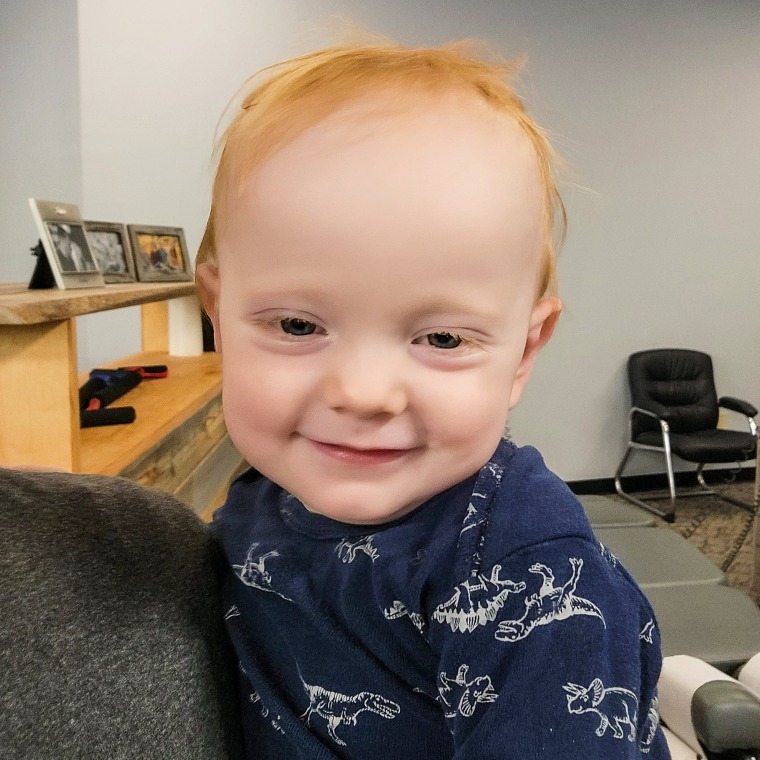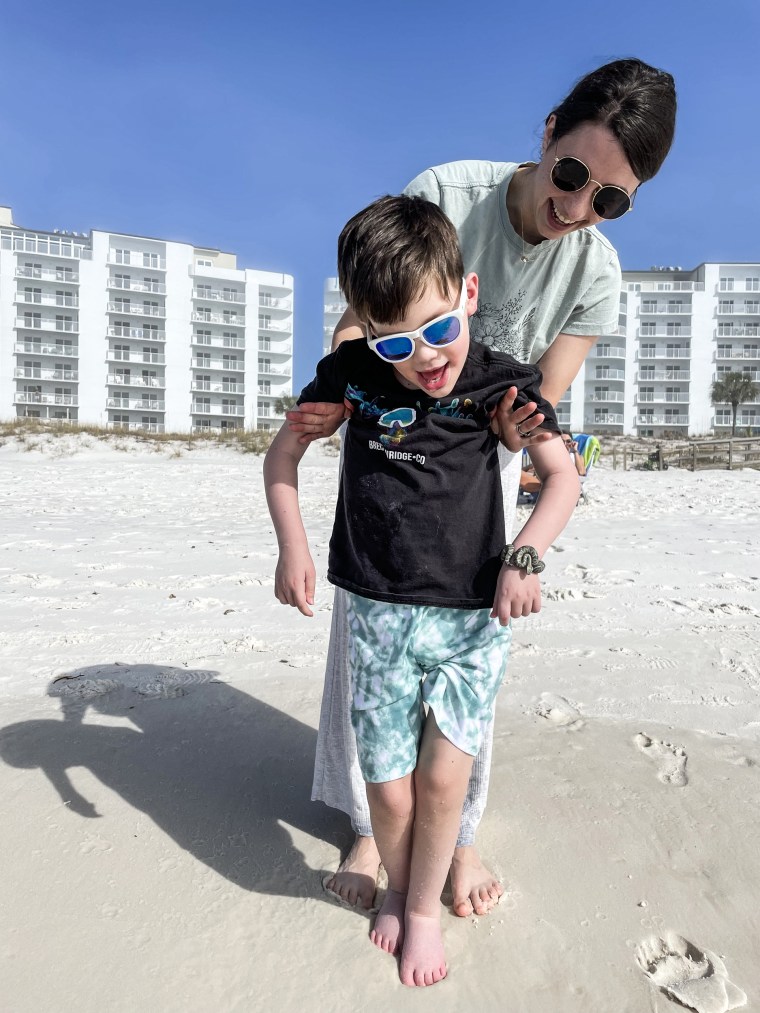Arthur Hutchinson was a contented, goofy 1-year-old till a number of months in the past, when he mysteriously stopped crawling and sitting up on his personal.
Genetic screening revealed that he had Krabbe illness, a uncommon dysfunction that may result in nerve harm.
The situation is normally deadly, but when infants get stem cell transplants earlier than signs develop, they could nonetheless be capable of stroll and discuss. By the point Arthur was recognized, the perfect his dad and mom, Allissa and Michael Hutchinson, might hope for was to increase his life by a number of years through a transplant.
He underwent surgical procedure this month.
“If this works, we’re going to be bringing house a severely disabled youngster that might have lived a extra regular life had a new child screening been carried out,” Allissa Hutchinson stated on the cellphone from the intensive care unit after Arthur’s transplant.
Like most infants, Arthur was screened for dozens of illnesses on the hospital as a new child. However Krabbe wasn’t on the record.
Every state units its personal record of illnesses for which newborns are screened, so the lists differ. Arthur and his dad and mom dwell in South Carolina, which handed a regulation in 2019 including Krabbe and two different genetic issues to its routine new child screening. However the state’s Krabbe screenings did not get underway till final month.
Arthur was recognized in March, at 20 months.
The Hutchinsons have since joined a refrain of fogeys who’re pushing to vary each state-level insurance policies on genetic screenings for newborns and federal pointers.

These dad and mom, lots of whom have skilled the horror of studying that their kids have uncommon illnesses for which earlier intervention might need made a distinction, say screening infants for extra situations might save lives.
The Division of Well being and Human Companies recommends that newborns get screened for 37 issues, together with cystic fibrosis and Pompe illness, in addition to 26 different associated issues. Krabbe illness isn’t on the record.
In accordance with HHS, states largely comply with the really helpful record, and a few display screen for extra issues. Ten states, as an example, check for Krabbe.
Dr. Michael Warren, the affiliate administrator of HHS’ Maternal and Baby Well being Bureau, stated new child screenings determine round 12,000 infants a 12 months with situations that may be life-threatening or life-altering.
However in response to the EveryLife Basis for Uncommon Ailments, a nonprofit advocacy group, no state screens for all 37 major issues. Nevada, as an example, screens for 31. New York, which has probably the most complete applications, exams for Krabbe illness and all federally really helpful situations besides one, Hunter syndrome.
However even when all states adopted the federal record, a number of illness specialists stated, it might barely scratch the floor of issues that warrant testing and remedy.
Dr. Robert Inexperienced, a geneticist at Brigham and Girls’s Hospital in Boston and Harvard Medical College, printed analysis final month that recognized 649 treatable illnesses linked to single genes.
“What was as soon as untreatable is changing into treatable,” Inexperienced stated.
The case for extra genetic screening
Docs who deal with Krabbe say the advantages of early screening could be manifold.
“It’s a kind of illnesses the place you’re sort of shocked that it’s not screened,” stated Dr. Maria Escolar, a pediatrician on the College of Pittsburgh who makes a speciality of neurodevelopmental disabilities.
Doing so, Escolar stated, would allow extra infants with Krabbe to enter medical trials, which in flip might exhibit the efficacy of further therapies. Already, early stem cell transplants enable some infants to dwell into their teenagers and stroll with out wheelchairs, she stated.
Dr. Melissa Wasserstein, the chief of pediatric genetic drugs at The Youngsters’s Hospital at Montefiore Medical Heart in New York Metropolis, stated she, too, is a “agency believer in earlier detection and earlier availability of therapies” for Krabbe and different situations.
Wasserman runs a pilot analysis program in New York that screens infants for 14 issues not within the state’s routine panel. This system plans to enroll greater than 100,000 infants inside the subsequent few years, aiming finally to collect information in help of including extra situations to state or federal screening lists.
“As a medical geneticist who treats kids with these issues, I believe that each one of them are related and vital for new child screening,” Wasserstein stated, including, “One of many objectives is that we will actually assist facilitate and transfer that course of alongside faster by giving them lots of pre-made information.”
Wasserstein highlighted metachromatic leukodystrophy, or MLD, as one other situation for which new remedy developments help screening. The illness causes extreme harm to the mind and the nervous system.
A gene remedy for MLD is already authorized within the European Union and the U.Ok., and it “appears to have superb efficacy at what’s in any other case actually a progressive, deadly illness,” she stated.
Limitations to increasing genetic screenings
Getting a situation added to the federal Really helpful Uniform Screening Panel is a heavy carry, stated David Barrett, the CEO of the American Society of Gene and Cell Remedy.
“There must be a remedy for the situation and a validated lab check,” he stated.
Generally, even assembly these necessities is not sufficient. For instance, Leber congenital amaurosis, a uncommon genetic eye dysfunction, is not on the federal record despite the fact that the Meals and Drug Administration authorized a gene remedy for it in 2017.
Dylan Simon, the director of coverage at the EveryLife Basis, stated that in deciding which situations to incorporate, HHS considers the speed of false positives and appears for proof that remedy earlier than signs seem improves a prognosis.
However that information is usually exhausting to return by, Simon stated.
“If it’s a uncommon illness, it’s exhausting to collect all of the proof due to the very nature of the illness, so it’s a bit of little bit of a Catch-22,” he stated.
Inexperienced additionally identified that even when a genetic situation can’t be handled, a prognosis should be helpful.
“Let’s say it’s a mutation for a coronary heart downside. You don’t essentially must go and do loopy surgical procedure or workup, but when that youngster begins having fatigue or fainting spells or one thing, you’ve obtained line of sight to one of many earliest clues,” he stated.
Genetic testing even altered the course of a authorized case this month: After having spent 20 years in jail within the deaths of her 4 kids, an Australian girl was pardoned following the invention that two of the kids had a genetic mutation that can lead to sudden cardiac demise.
Krabbe: A ‘obtrusive omission’ from the federal record
The Hutchinsons hope to ultimately get Krabbe added to the federal new child screening pointers. Simon stated his basis considers it “one of many obtrusive omissions” from the record.
However the illness is a chief instance of the challenges in increasing the suggestions. The Advisory Committee on Heritable Issues in Newborns and Youngsters, which determines which situations are advised for screening, has opted twice to not add Krabbe.
The newest vote, in February, was a tie, which meant Krabbe couldn’t be included. Some committee members expressed considerations in regards to the dangers of stem cell transplants — equivalent to life-threatening infections — in addition to the feasibility of intervening earlier than the illness progresses too far.
“The committee had a tough time with this, and that’s mirrored within the vote,” Warren stated.

Sloane Kirbo stated she has typically puzzled what her son Cloud’s life might need appeared like had he been screened for Krabbe illness at start.
Cloud misplaced the flexibility to stroll, sit up or feed himself inside a month when he was 3.
The Kirbos dwell in Georgia, the place a 2017 regulation gave dad and mom the choice to ask for Krabbe exams. However Cloud was born the 12 months earlier than, so he wasn’t eligible.
“Our largest factor was like, ‘Oh, my gosh, if he simply would have been born in a special state, he wouldn’t be wheelchair-bound,'” she stated. “He wouldn’t must be home-schooled. He wouldn’t must go to therapies each single day of the week.”
Kirbo stated most dad and mom didn’t know to ask for the check anyway. Her household petitioned in 2020 to have Krabbe formally added to Georgia’s new child screening panel. The state opted for a three-year pilot program that ends subsequent 12 months however might be renewed.

Idaho, the place Piper Morse and her son Grayson dwell, doesn’t do Krabbe screenings at start. Grayson was recognized earlier than he turned 1, and he obtained a lifesaving stem cell transplant, however he depends on a feeding tube and might’t discuss or stand on his personal.
“Each minute of the illness with signs is sort of a 12 months — they progress so quick,” Morse stated. “You need that prognosis and also you need that transplant as quick as doable.”







